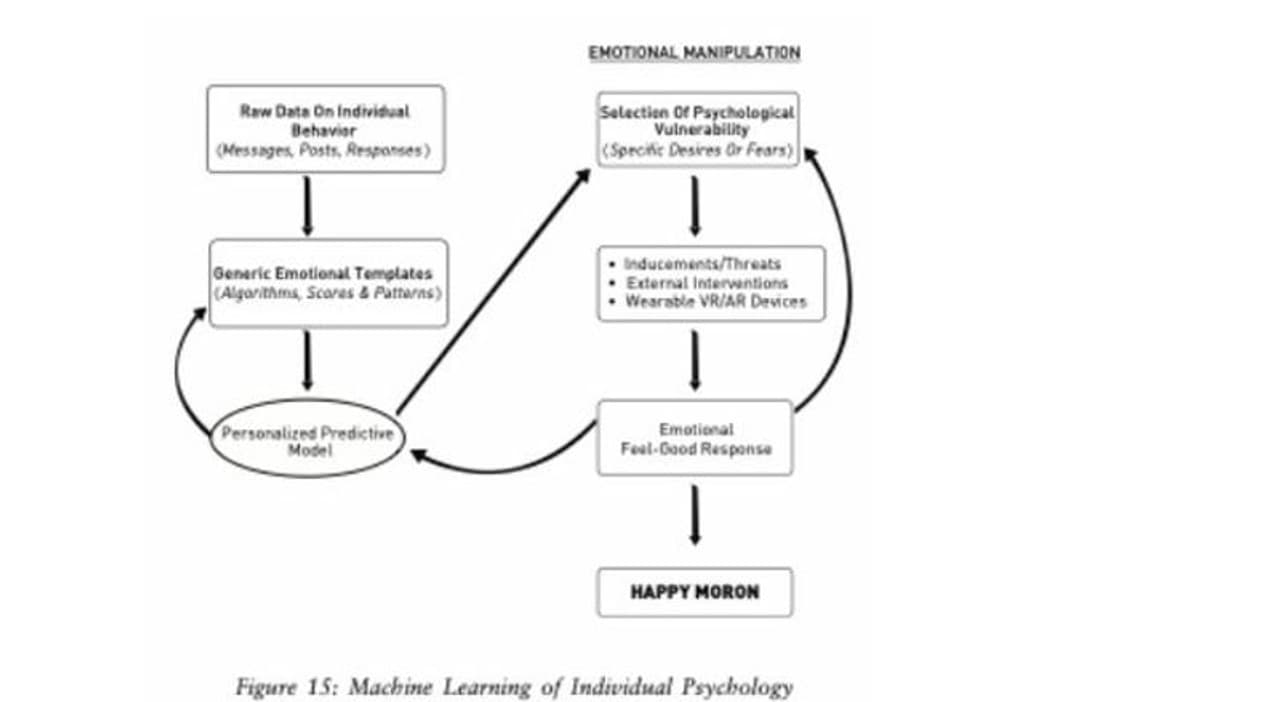Excerpts from Artificial Intelligence and the Future of Power By Rajiv Malhotra
Digital Slavery
A common technique for training AI systems is to throw a variety of stimuli at people simply for the purpose of measuring their emotional response. By tracking and analyzing responses, machines develop ever more sophisticated psychological maps of people, and in the process become emotionally savvy.
Figure 15 illustrates two distinct processes. On the left is the machine learning process by which users’ personal psychology is determined. The system monitors users and creates a personalized predictive model, or map, of their private psychology. The right illustrates how digital platforms use these personalized predictive models to create what I call happy morons. Exploiting their predictive models, machines offer inducements (or threats) to drive behaviour and addict users to the platform and its alleged benefits.

In the future, with upgraded facial recognition and biometric monitoring, Kindle will be able to record what makes you happy, sad, or angry while you are reading. With that information it will be able to select books for you to read and might even customize a book that would be appropriate in each set of circumstances.
Likewise, Netflix has developed the ability to choose movies for individual members with incredible success. Individuals’ response profile and what gratifies their inclinations are classified by types of desire, ranging from prestige to lust. It has recently launched the "choose your own story" interactive show where users make decisions on what happens to the characters.
Tracking these choices enables Netflix to profile the psychology of its viewers as it can predict what users might do when presented with situations similar to what is in their shows.
Netflix brags about its growing success in predictively modeling user behavior.
Facebook uses tens of thousands of factors such as clicks, likes, shares, comments and personal interests to determine users' news feed. Its marketing material solicits advertisers by bragging how well it can influence the emotions of users by such manipulations. Depending on what is in the best commercial interests of Facebook, its algorithms decide how to filter the information presented to each individual user. It is important to note that there is no such thing as an objective choice of content being made on our behalf. Susskind summarizes this phenomenon aptly.
News and search services, communication channels, affective computing, and AR platforms—will determine what we know, what we feel, what we want, and what we do. In turn, those who own and operate these systems will have the power to shape our political preferences. ...Our very perceptions are susceptible to control, sometimes by the very institutions we would seek to hold to account. It’s hard to contribute rationally when your political thoughts and feelings are structured and shaped for you by someone else.
The more this type of customization succeeds, the more it will empower machine algorithms and strip humans of their autonomy.
Keeping these billions of surplus people in a virtual state of pleasure, delivered by technologies such as VR and AR, will be an attractive proposition. Artificial Intelligence suppliers will tout this as a positive use of technology for the psychological management of people deemed to be parasites. Perhaps, one of the applications of AR would be to give people the experience of virtual children since the physical birth of children would have been curtailed.
The AI technology that created the demographic crisis will also develop solutions to solve it in a manner acceptable to the sensibilities and legalities of that time. The happy morons will be augmented by technology for binge-watching movies, indulging in artificial sexual gratification, enjoying fantasy vacations, and becoming artificially intoxicated with the help of implants. Letting them escape happily in a decadent, degenerate, and passive state would bypass ethical dilemmas of human rights abuses, and at the same time get the vast majority of human population out of the way for the superhumans to take custody of the world.
The task will require sophistication in the psychological management of the masses. As noted in Chapter 4, the aestheticization of power describes the use of aesthetics to secure and maintain political power over the masses even as they are suffering in a pragmatic sense. The use of aesthetics as a cover for pragmatic goals will become a strategic tool in managing overpopulation. The elites and their technology will offer a variety of ways for the useless humans to indulge in pleasurable, feel-good activities and hold lofty ideas about themselves.
As a widening range of entertainment services become available, on terms set by the new establishment, AI technology will further engineer and mold behavior.
Humans will have the capability to live in a fantasy land concocted through VR and AR products, including implants, wearables, genetic modifications, and neuroscientific manipulations, as well as mood-altering or psychotropic stimulants, sedative hypnotics, and hallucinogens. An entire industry will spring up just for the purpose of enabling large numbers of people to live as happy morons. The masses will effectively be disarmed in a make-believe world.
At the hedonistic extreme, promiscuity will become a tool for manipulation and suppression. For example, an AI application could reward individuals with orgasms on demand or metered at a certain frequency. The application would become addictive and thus serve as a psychological weapon for wielding control over people. The frequency, intensity, and type of experience could also be withheld as punishment, resulting in withdrawal symptoms.
The effect will be a new kind of colonization: the conquering of human aesthetics through machines. Figure 28 shows the happy moron syndrome as a self-perpetuating process.
Large numbers of our youth today are already unconsciously serving as experimental subjects in testing and perfecting the machine learning algorithms for aesthetic management. Ironically, they seem to enjoy the process of surrendering their sovereignty.

